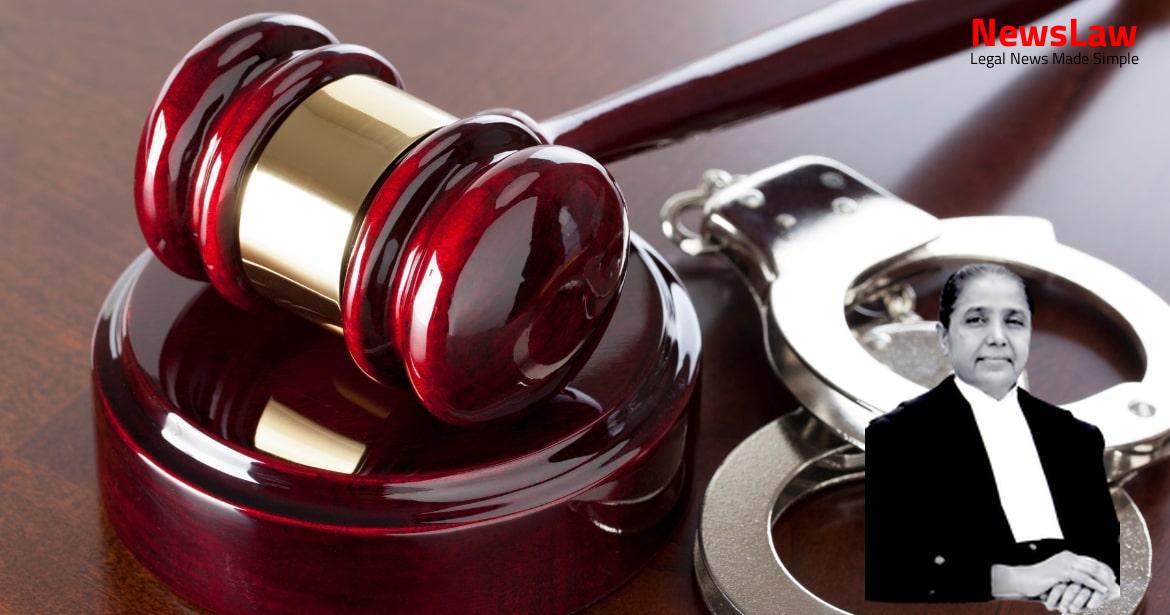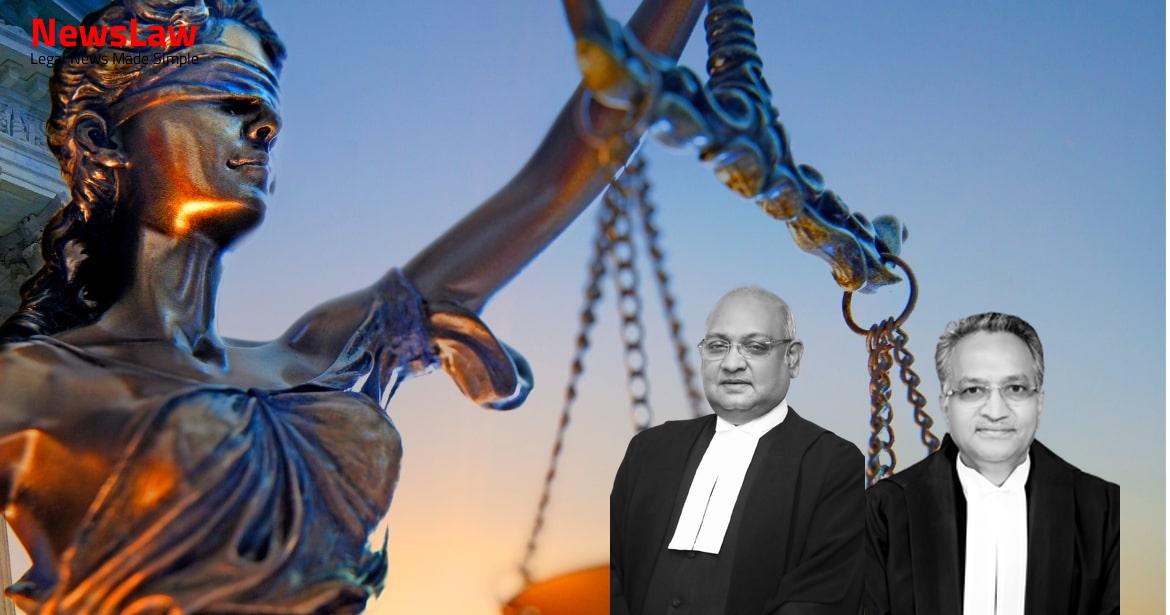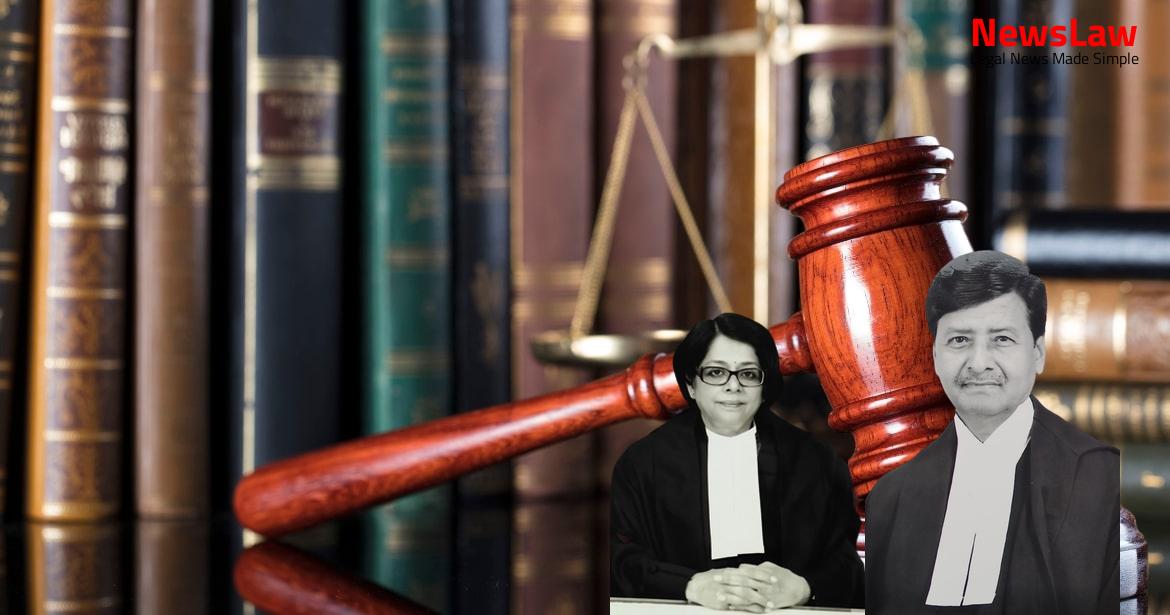The legal analysis delves into the jurisdiction of the High Court under Article 226 of the Constitution amidst a detailed scrutiny of the statutory scheme under consideration. The examination focuses on the court’s authority to pass interim or final orders within the framework of the statutory provisions. Stay tuned for insights into how the High Court’s interpretation impacts the essence of judicial power and constitutional rights.
Facts
- The respondent No.5 filed a Writ Petition challenging the rejection of her claim to belong to the ‘Koyari’ caste by the Scrutiny Committee.
- An interim order was passed directing the authorities not to take any coercive action against respondent No.5 based on the Scrutiny Committee’s order.
- The Municipal Corporation Act required candidates to submit caste validity certificates on the date of filing nomination papers.
- Candidates who applied for caste certificate verification before nomination but did not receive the validity certificate had to submit an undertaking to do so within a specified period.
- The petitioner continued to hold office due to the interim order, which extended the submission deadline from six to twelve months by an Amendment Act in 2018.
- The provision requiring submission of caste and validity certificates for reserved seats was in force at the time of the election.
- Further amendments were made to extend the submission deadline from six to twelve months post the election.
- Two more provisions of Maharashtra Act No LXV of 2018, under Chapter V ‘Miscellaneous’, were noted.
- The respondent No.5, who was elected on 23.02.2017, had to submit the caste scrutiny certificate within six months, as per the existing Section 5B at that time.
- The respondent’s claim was rejected by the Caste Scrutiny Committee, leading to a writ petition and an interim order preventing disqualification actions.
- The respondent continued to hold office due to the stay of disqualification actions.
- The Scrutiny Committee’s order dated 14.08.2017 regarding the respondent’s caste belonging was mentioned.
- The provision of Section 5B, initially deleted, was re-inserted by Maharashtra Act No.21 of 2012.
- Challenges to the orders dated 02.04.2019 and 02.05.2019 were made by the appellant in this appeal.
- The petitioner’s claim was found to be improperly rejected, and the orders were quashed, allowing them to continue holding their post.
- The respondent No.5, declared elected on 23.02.2017, should not be left without a remedy.
- The High Court, in its judgment dated 02.04.2019, allowed the writ petition filed by respondent No.1 and remanded the matter to the Scrutiny Committee for fresh consideration.
- The order of the Scrutiny Committee dated 14.08.2017 rejecting the claim of the respondent was deemed unsustainable by the High Court.
- The respondent No.1 was directed to continue in her seat as the effect of disqualification was postponed by an interim order.
- A review petition was filed against the judgment and order dated 02.04.2019.
- The High Court also allowed a writ petition filed by respondent No.5 by setting aside the order of the Caste Scrutiny Committee.
- Respondent No.5 was declared to belong to Koyari Caste, and was entitled to continue in her seat as the effect of disqualification was postponed by an interim order.
Also Read: Interpretation of Lease Agreement and Compulsory Registration
Issue
- Whether the jurisdiction of the High Court under Article 226 of the Constitution of India is ousted due to the statutory Scheme of Section 5B of the Mumbai Municipal Corporation Act.
- Whether the High Court had no jurisdiction to pass an interim or final order that interdicts the statutory fiction under Section 5B, causing disqualification of a candidate for being a Councillor if the Caste Scrutiny Certificate is not submitted within the specified time frame.
- Challenging whether certain provisions of the Kerala Education Bill, specifically clause 33, violate Article 226 of the Constitution in any way.
Also Read: Enhancing Compensation and Modifying Sentences: A Legal Analysis
Arguments
- The respondent’s tenure had not ended, so no direction was given to continue them beyond their term.
- Legislative casus omissus cannot be filled by judicial interpretation.
- The requirement of submitting a Caste Validity Certificate within one year is mandatory as per the Bombay High Court’s Full Bench Judgment.
- The power of High Courts under Article 226 overrides other rules or laws in certain circumstances.
- The Constitution is the supreme law, and only a constitutional amendment can affect its provisions like Article 226.
- High Court’s interim relief was granted in aid of the main relief and cannot go beyond the statutory period as in Section 5B.
- Mandamus cannot be issued against a statute as held by this Court in State of U.P. vs. Harish Chandra.
- The High Court was not empowered to continue interim relief beyond one year from the election date under the statutory scheme of Section 5B.
- Strict construction of Section 5B is required as it is a mandatory provision of the Mumbai Municipal Corporation Act.
- The High Court passed an order in a timely manner, considering a wrong order in a Writ Petition.
- An interim order was rightfully passed to protect the respondent’s rights and prevent the whole exercise from being fruitless.
- The right of the respondent to judicial remedy is considered a Fundamental Right.
- The Caste Scrutiny Committee has now verified the respondent’s caste in compliance with a remand order, and the order will be retroactively effective from the initial date of 14.08.2017.
- The counsel for respondent No.5 in Civil Appeal No.1431/2020 argues that the jurisdiction under Article 226 cannot be restricted by any statutory provision.
Also Read: Transfer of Writ Petitions for Chartered Accountants’ Tax Audit Guidelines
Analysis
- Section 5B of the Mumbai Municipal Corporation Act does not restrict the jurisdiction of the High Court under Article 226 of the Constitution.
- The High Court’s decision to continue respondent No.1 in Civil Appeal Nos. 1429-1430 of 2020 until the Scrutiny Committee’s decision is taken, was found to be without error.
- The High Court in Civil Appeal No. 1431 of 2020 set aside the Scrutiny Committee’s order and declared the respondent to belong to the Koyari backward class.
- The Caste Scrutiny Committee upheld respondent No.1’s claim to belong to the backward class based on an order dated 30.09.2019.
- Overall, no error was found in the High Court’s judgment dated 02.04.2019 based on the discussions and conclusions provided.
- Section 19(3)(c) of the Prevention of Corruption Act mandates that no court shall stay the proceedings under the Act on any other ground.
- High Courts have the jurisdiction to examine decisions of all tribunals to ensure they have not acted illegally, as per Articles 226 and 136 of the Constitution.
- Article 323A allows for the adjudication by administrative tribunals of disputes related to recruitment and conditions of service in public services.
- Failure to produce a validity certificate within six months from the date of election results in disqualification for being a Counsellor.
- Section 11A of the Land Acquisition Act provides a legislative scheme for the timeframe within which an award should be made.
- The jurisdiction of the High Court under Article 226 is extensive and allows for the granting of interim orders to maintain the status quo.
- The High Court has the authority to consider questions regarding its own jurisdiction raised before it.
- The power under Article 226 overrides any contrary provision in a statute, and the High Court’s power cannot be taken away by any statute.
- Judicial review is designed to prevent abuse of power by public authorities.
- The High Court, being a superior court of record, can determine its own powers and has the duty to protect the fundamental rights of citizens.
- The High Court can pass interim orders even in election matters to safeguard the rights of individuals.
- The validity of an act or conclusion rests outside the decision of an inferior tribunal, and jurisdiction is primarily with superior courts like the High Court and Supreme Court.
- The High Court has the power to maintain the status quo to prevent injustice resulting from decisions of statutory authorities.
- In cases where a citizen’s rights are affected by decisions of authorities, the High Court can use its judicial review power to enforce legal remedies.
- The High Court cannot ignore the law or overrule it while exercising its constitutional power under Article 226.
- The jurisdiction of courts is carved out of the sovereign power of the State.
- The power of a court set up by the Constitution is inherent and stems from being a superior court of record.
- The High Courts and the Supreme Court’s jurisdiction under Articles 226/227 and 32 of the Constitution cannot be excluded by legislative provisions.
- The power of judicial review is a basic structure of the Constitution and cannot be taken away.
- The High Courts are superior courts of record with inherent and supplementary powers.
- Article 226 empowers High Courts to issue writs for enforcement of rights under the Constitution or for any other purpose.
- The High Courts remain with full jurisdiction despite statutory provisions.
- High Courts must exercise their jurisdiction based on well-established judicial norms.
- The power of the High Courts under Article 226 is meant for protection of citizens’ fundamental rights.
- The judicial power of the High Courts and Supreme Court involves the right of citizens to appeal to them in cases of violation of fundamental rights.
- The Full Bench of the Bombay High Court and a Three-Judge Bench of the Supreme Court did not address the issue of whether the High Court has the authority under Article 226 to stay the effects of deeming provisions.
- If there are no orders in place to halt the consequences of deeming fiction as outlined in the proviso to Section 5B, the election would automatically be terminated retrospectively.
- In the present case of both appeals, the High Court’s order prevented the retrospective termination from occurring by staying the consequences of the deeming fiction as per the second proviso of Section 5B.
- A reference was made to the case of K. Prabhakaran Vs. P. Jayarajan, (2005) 1 SCC 754 where it was highlighted that even if a conviction is later set aside, the disqualification that was in effect on the relevant dates would remain.
Decision
- Petitioners in Writ Petition Nos. 145/2018 and 3673/2018 allowed to continue in their seats due to the quashing of the impugned order.
- Validity of the interim order dated 18.08.2017 and final judgment dated 02.04.2019 under consideration.
- Appeals filed against common judgment dated 02.04.2019 in Writ Petitions dismissed.
- Time taken in adjudication should not be used against respondent No.5.
- Interim order by High Court granted to protect the rights of respondent No.5 during writ petition pendency.
- High Court can pass orders interdicting legal fiction under Article 226 if not in operation.
- Interim and final judgment orders were not beyond High Court’s jurisdiction under Article 226 of the Constitution.
- Writ petition finally decided by the Bombay High Court on 02.04.2019.
Case Title: BENEDICT DENIS KINNY Vs. TULIP BRIAN MIRANDA (2020 INSC 320)
Case Number: C.A. No.-001429-001430 / 2020



